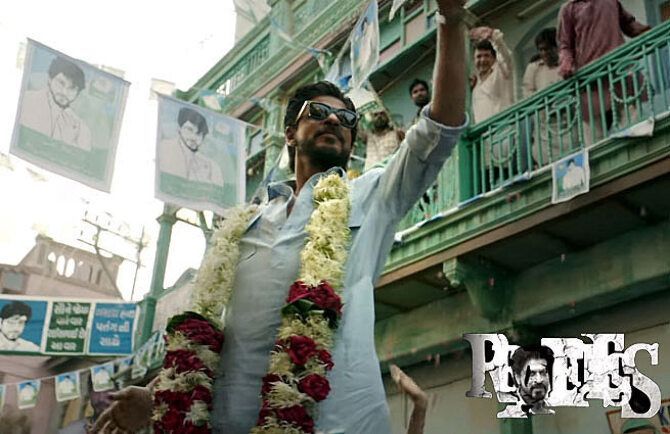Raees does not have even a token sane Muslim character that has been a staple of Bollywood, says Mohammad Asim Siddiqui.

A thin line separates the anti-hero of Hindi cinema from the villain.
While the anti-hero can steal, rob, and kill without remorse -- much the same things that the villain will do -- he cannot transgress some codes.
He can harass women, but not rape.
He can sell guns, but not drugs.
And above all he cannot act against his country.
These are the jobs that the villain is paid to do.
These are the codes that Hindi cinema has followed faithfully.
Despite occupying screen time for most part of the film, Shah Rukh Khan is not the hero of Raees in the traditional sense of the word.
If his negative character had the sympathy of the audience in Baazigar, aroused amusement and admiration in Darr, that sympathy and admiration is no longer uniform in Raees.
It is not unusual in a film to clap for the bad boy, but the character played by Nawazuddin Siddiqui who is pitted against the hero, has the audience on his side in the latter part of the film.
That way in Raees Shah Rukh Khan goes further than Anjaam which won him the Filmfare award for a character in a negative role.
In fact he deserves credit for essaying a role that few mainstream heroes would have played with as much conviction.
Raees also differs from many mainstream films in its total exclusion of even a single positive Muslim character.
The film reinforces stereotypes about Muslims. That Shah Rukh's character is not the usual anti-hero would have been okay if Raees had been a biopic.
Despite the disavowal of the Raees team, it is common knowledge that the film draws its inspiration from the life of Abdul Latif, the bootlegger cum don from Ahmedabad in the 1980s.
In a Times of India article Prashant Dayal writes that in the 1995 assembly elections in Gujarat, 'Latif became a symbolic target and no election speech of a BJP leader was complete without the mention of Latif and his connections with Dawood Ibrahim and the Congress.'
Raees tries to pass as a gangster film, but its Gujarat context raises issues that the film cannot solve easily.
The film is too overburdened with its context to be a decontextualised narrative about the life of just any gangster.
Muslim criminals having a field day in the film in the Gujarat of the 1980s prepares the ground for a government that will fix them.
The film represents the Muslim ghettos of Gujarat and the world of both petty and organised crime.
The Muslim quarter in the film is the breeding ground of crime.
The ambiguous philosophy of Raees's mother Koi dhandha chhota nahin hota, which Raees follows religiously, is aptly replied by Nawazuddin's character Majmudar 'Jise tu dhanda bolta hai woh crime hai.'
The interesting thing about Raees is that all Muslim characters in the film, without any exception, are criminals.
Usually, it is the beloved or the mother of the protagonist in Hindi cinema who issues a moral warning to the hero, especially if his actions are against the society or nation. Raees' wife has no qualms about his misdeeds. Even Raees' mother cannot be exonerated from the charge of not articulating the family morality clearly, a task that she leaves for Majmudar to fulfill.
Raees has the flavor of 1970s gangster and crime films, but it does not have even a token sane Muslim character that has been a staple of Bollywood.
Bollywood films have usually divided their Muslim characters on both sides of the law. They have usually paraded their patriotic Muslim characters.
The Muslim don who prays but kills with gay abandon but will certainly not act against his master or his nation is not an uncommon character in Hindi cinema. That way Raees is an exception.
A criminal but not anti-national Raees being taken for a ride by an anti-national Musa does not redeem Raees.
He also does not have the redeeming qualities of Sultan Mirza (played by Ajay Devgan in Once Upon a Time in Mumbai), which was loosely based on the life of Haji Mastan, another don turned politician.
On the other hand the cynicism of a responsible officer like Majmudar, brilliantly played by Nawazuddin Siddiqui, most evident in the encounter killing scene, makes him the hero of the film.
The film settles the problem of ending by too much reliance on realism, taking recourse to poetic justice and not criminal justice.
The setting of this scene in Gujarat makes it more meaningful.
But then does it all matter that the director of a sensitive film like Parzania tries his hands at a blockbuster?
Mohammad Asim Siddiqui teaches English at Aligarh Muslim University.
- Raees and fall of the don
- Why the Raeestrailer offends me
- How Abdul Latif, Gujarat's dreaded gangster, was arrested
Check out more FASCINATING features in the RELATED LINKS below!










